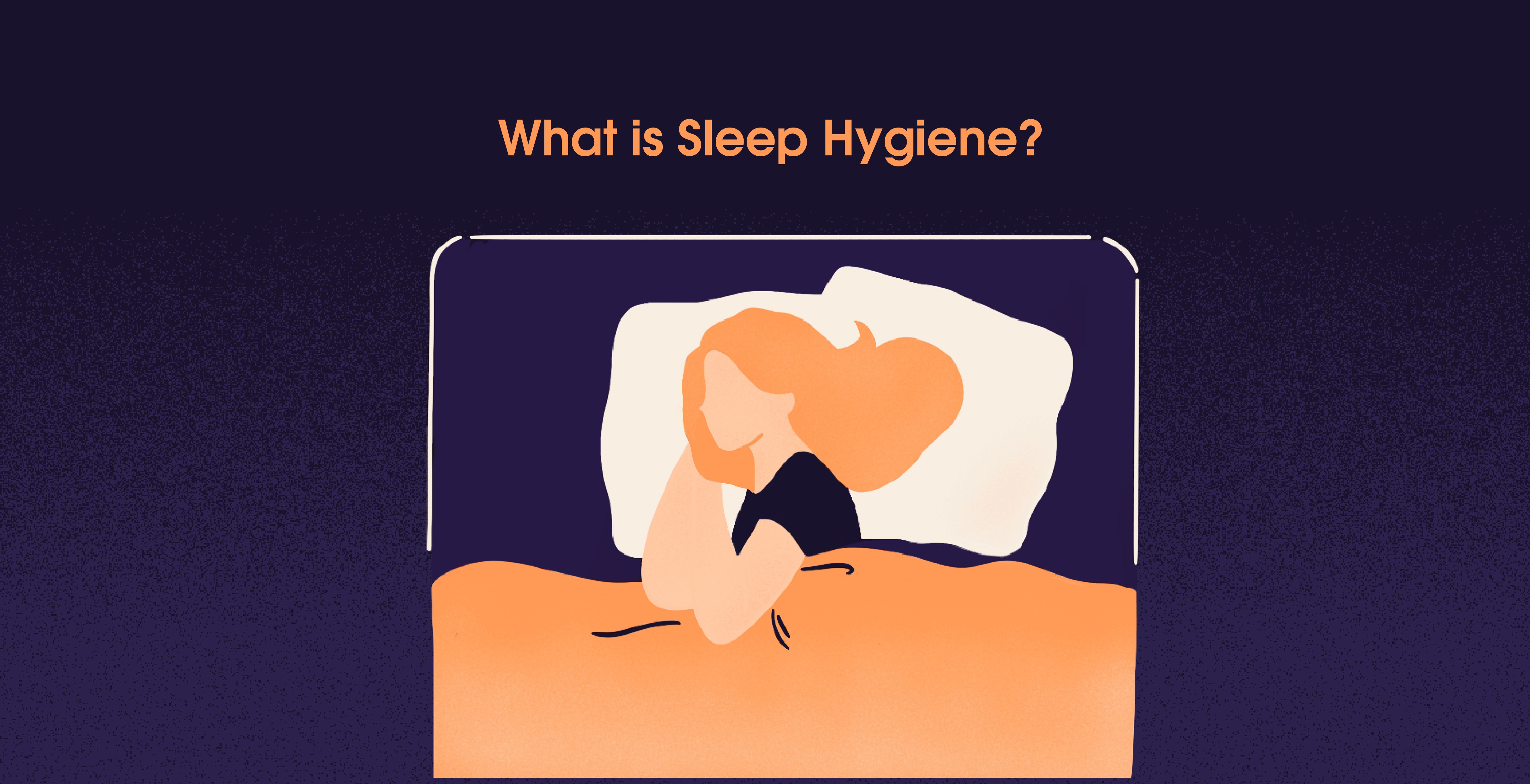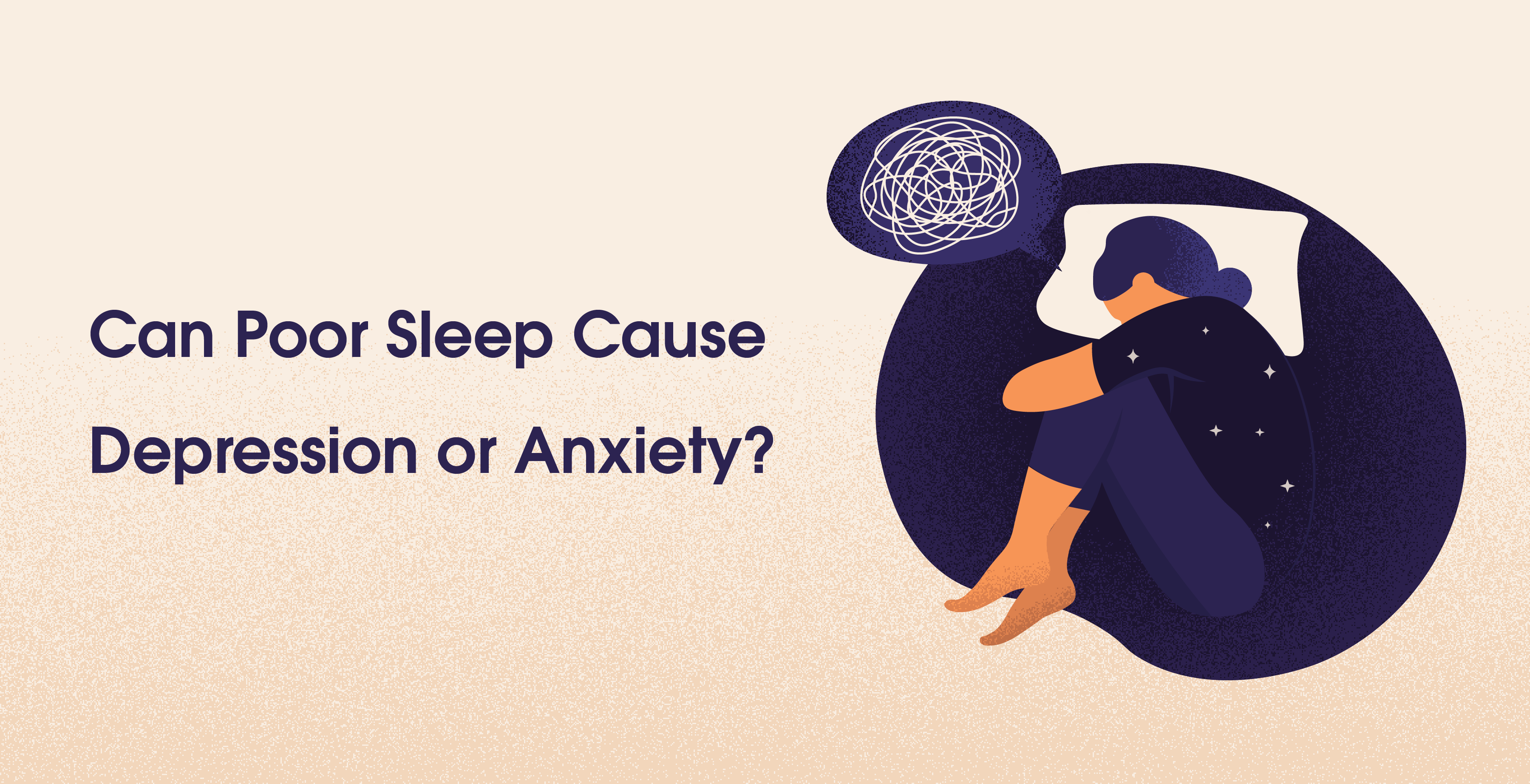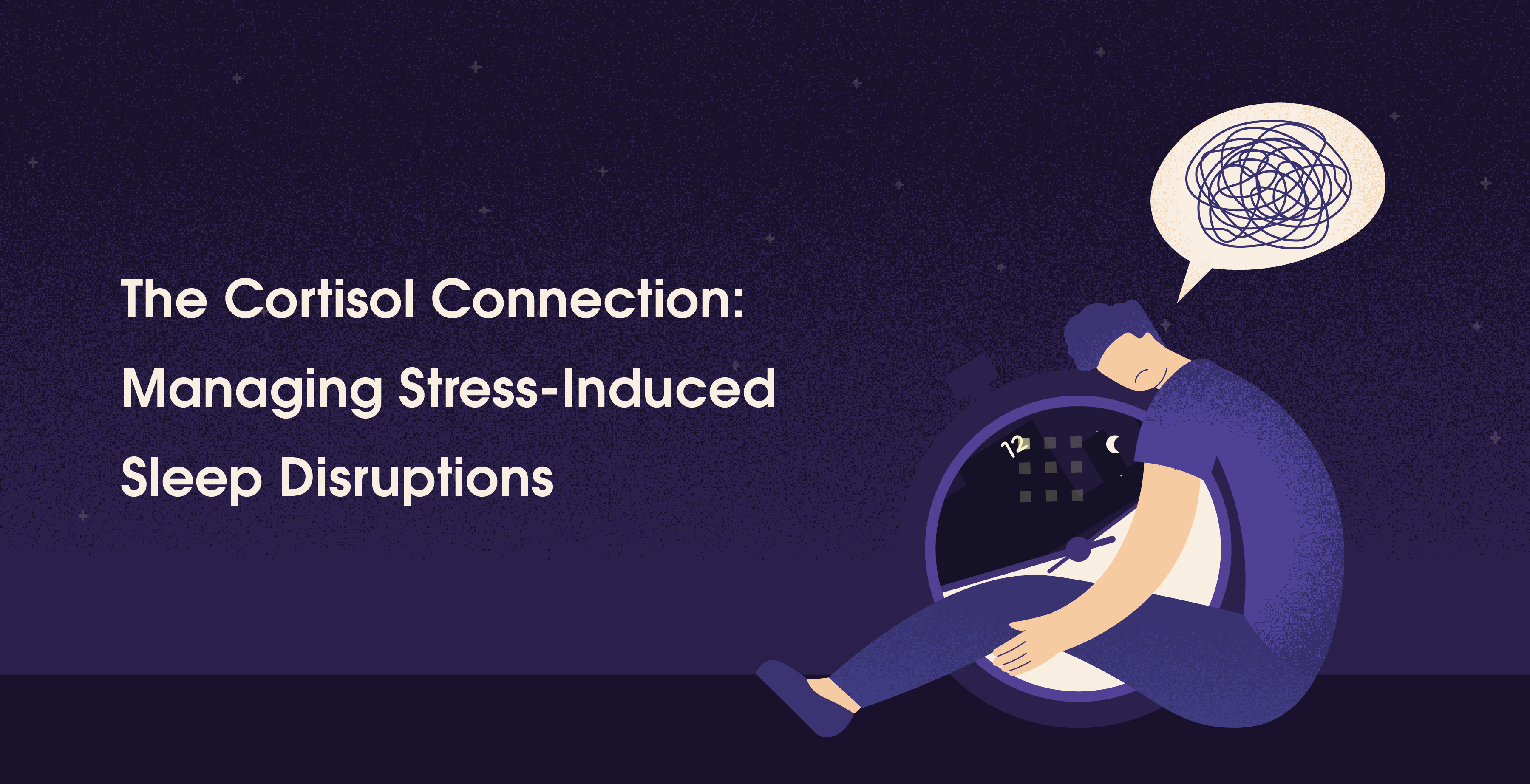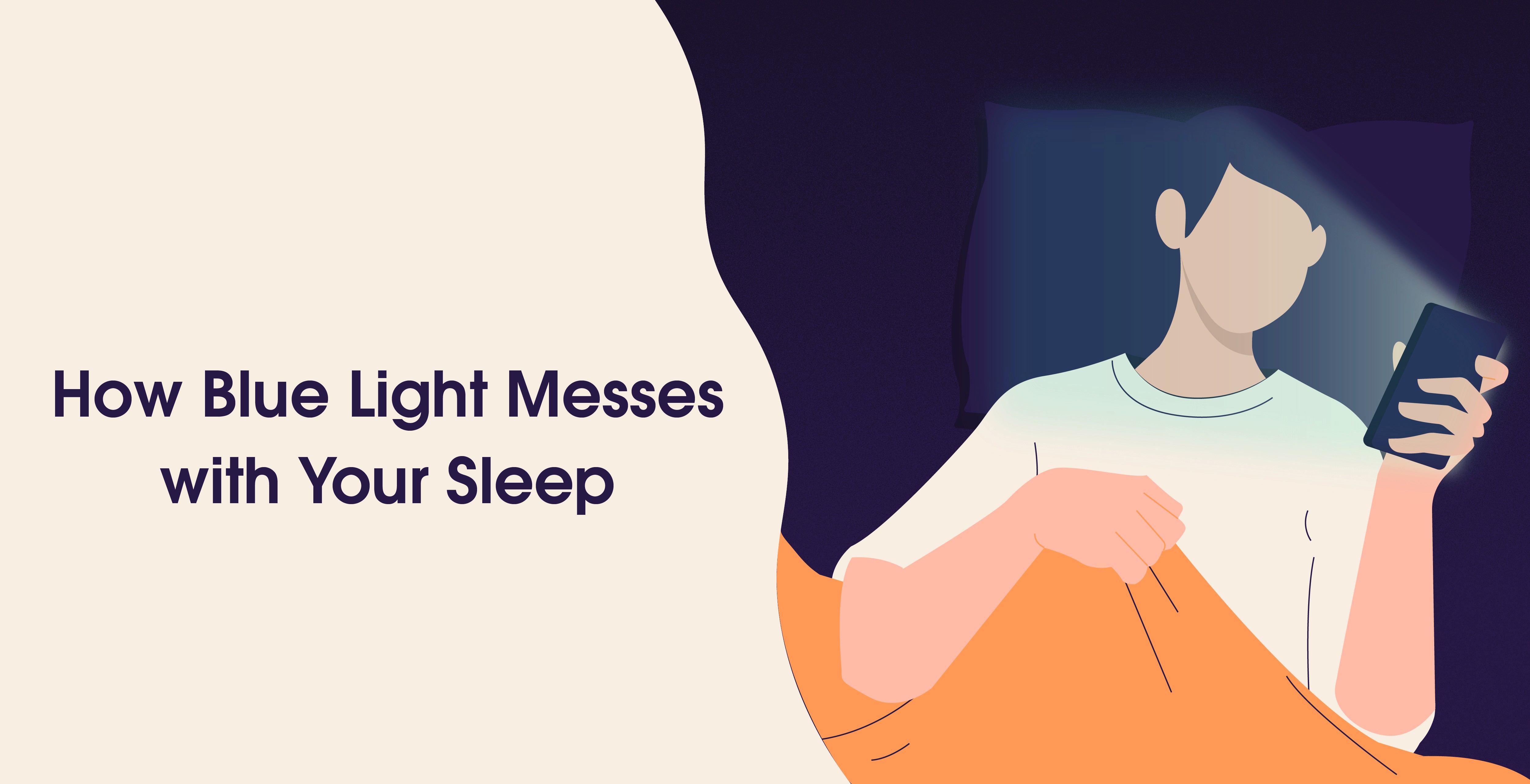What is Sleep Hygiene
Apr 20, 2024
Heer Chedda



Table Of Contents
We all know the feeling - tossing and turning at night, staring at the ceiling, desperate for sleep to come. Whether it's due to stress, an irregular sleep schedule, or an underlying health condition, poor sleep can have a significant impact on our physical and mental well-being. This is where the concept of "sleep hygiene" comes into play.
Highlights
Sleep hygiene refers to the habits and practices that promote quality, restorative sleep. This encompasses factors like the sleep environment, consistent sleep-wake times, bedtime routines, and lifestyle habits that impact sleep.
Neglecting good sleep hygiene can have wide-ranging negative consequences, such as impaired cognitive function, weakened immune system and increased risk of chronic diseases.
There's a strong connection between sleep hygiene and diabetes. Poor sleep can disrupt glucose metabolism and insulin sensitivity.
What is Sleep Hygiene?
Sleep hygiene refers to the habits and practices that are conducive to getting quality, restorative sleep on a regular basis. It encompasses a wide range of elements, including:
The sleep environment (bedroom temperature, lighting, noise levels, etc.)
Consistent sleep and wake times
Bedtime routines and pre-sleep activities
Dietary and lifestyle habits that impact sleep
The goal of cultivating good sleep hygiene is to create the optimal conditions for your body to naturally transition into and maintain a restful, restorative sleep state.
Consequences of Poor Sleep Hygiene
Neglecting good sleep hygiene can have a wide range of negative consequences for your health and daily functioning. Some of the potential impacts of poor sleep hygiene include:
Impaired cognitive function
During sleep, your brain consolidates memories, organizes information, and clears out waste products. When your sleep is insufficient, these critical processes are impaired, leading to difficulties with concentration, memory, and decision-making.
Sleep deprivation has been shown to reduce activity in the prefrontal cortex of your brain, which is involved in higher-order cognitive functions. This can result in decreased alertness, slower reaction times, and impaired judgment, increasing the risk of accidents and errors for you.
Weakened immune system
Sleep plays a crucial role in the proper functioning of your immune system. During sleep, your body produces and regulates various immune cells and cytokines, which are important for fighting off infections and maintaining your overall health.Lack of sleep can disrupt the delicate balance of your immune system, leading to a reduction in the production and effectiveness of your immune cells, such as T cells and natural killer cells.
Increased risk of chronic diseases
Insufficient or poor-quality sleep has been linked to the development of various chronic conditions for you, such as type 2 diabetes, cardiovascular disease, and obesity.
Sleep plays a critical role in regulating your metabolic processes, including glucose metabolism and hormone secretion.
Disruptions to these processes can contribute to the development of insulin resistance and type 2 diabetes for you. Lack of sleep can also lead to increased inflammation in your body, which is a common factor in the development of cardiovascular disease and other chronic conditions.Furthermore, sleep deprivation can disrupt the regulation of your appetite-related hormones, such as leptin and ghrelin, leading to increased hunger, cravings, and potential weight gain, which are risk factors for obesity and its related comorbidities.
Mood disturbances
Sleep deprivation can lead to increased levels of cortisol, the body's primary stress hormone, which can exacerbate symptoms of depression and anxiety for you.
Additionally, the lack of restorative sleep can impair your brain's ability to regulate emotions, leading to increased irritability, mood swings, and other mood-related disturbances.
Weight gain and metabolic disruptions
Sleep plays a critical role in the regulation of your appetite-related hormones, such as leptin and ghrelin, which control your feelings of hunger and satiety.
Insufficient sleep can lead to an imbalance in these hormones, resulting in increased hunger, cravings for high-calorie foods, and a decreased feeling of fullness for you.
This hormonal dysregulation can contribute to weight gain over time, as you may consume more calories than you need due to the disruption in your body's natural appetite regulation.
The good news is that by prioritizing good sleep hygiene, you can mitigate these negative consequences and enjoy a host of benefits, including improved cognitive function, better overall health, and enhanced daily productivity and well-being.
Good Sleep Hygiene Practices
Establishing good sleep hygiene involves implementing a variety of habits and environmental adjustments. Here are some key components of a healthy sleep routine:
Consistent sleep-wake cycle
The body's internal clock, known as the circadian rhythm, is regulated by various environmental cues, with light being the most powerful. Maintaining a consistent sleep-wake schedule helps to synchronize the circadian rhythm, which in turn optimizes the release of hormones like melatonin and cortisol that are crucial for sleep-wake regulation.
Disruptions to the circadian rhythm, such as irregular sleep schedules, can lead to sleep disturbances and adverse health consequences.
Comfortable sleep environment
Your ideal bedroom temperature for sleep is around 65°F (18°C), as this slightly cooler environment helps to facilitate your natural drop in core body temperature that occurs during sleep. Exposure to bright light or excessive noise can disrupt your body's melatonin production and sleep-wake cycle, leading to difficulty falling asleep and poor sleep quality.
Blackout curtains and earplugs/white noise machines help to create a dark and quiet sleep environment, minimizing external stimuli that can interfere with your sleep.
Pre-bed relaxation routine
Activities like light stretching, reading, or taking a warm bath can help to lower the body's basal metabolic rate and core temperature, which are natural physiological cues for sleep.
Warm baths, in particular, can promote sleep by causing a rapid drop in core body temperature as the body works to dissipate the heat gained from the bath. This temperature decrease signals to the brain that it's time to initiate the sleep process.
Limit screen time
The blue light emitted by electronic devices can suppress the production of melatonin, the primary hormone responsible for regulating the sleep-wake cycle. Melatonin levels naturally rise in the evening, signaling to the body that it's time to sleep. The blue light from screens can disrupt this natural melatonin rhythm, making it harder to fall asleep.
Avoid stimulants
Caffeine is a stimulant that blocks the action of adenosine, a neurotransmitter that builds up throughout the day and promotes sleepiness. Nicotine is also a stimulant that can disrupt sleep by causing wakefulness and reducing the quality of sleep.
Alcohol, while initially sedating, can fragment sleep and reduce the restorative, deeper stages of sleep later in the night
Regular exercise
Physical activity has been shown to improve sleep quality by promoting the release of endorphins, reducing stress and anxiety, and helping to regulate the circadian rhythm.
However, intense exercise close to bedtime can be stimulating and make it harder to fall asleep, as it can temporarily raise core body temperature and increase the production of hormones like adrenaline and cortisol.
Sleep Hygiene and Diabetes
The relationship between sleep hygiene and diabetes is a particularly important one. Research has consistently shown that poor sleep can have a significant impact on glucose metabolism and insulin sensitivity, two key factors in the development and management of diabetes.
A study published in the Journal of the American Medical Association found that individuals who slept less than 6 hours per night had a 1.7 times higher risk of developing type 2 diabetes compared to those who slept 7-8 hours per night. Similarly, a meta-analysis of 10 studies involving over 107,000 participants revealed that both short (less than 5-6 hours) and long (more than 8-9 hours) sleep durations were associated with an increased risk of developing type 2 diabetes.
The mechanisms behind this connection are multifaceted. Lack of sleep can disrupt the body's regulation of hormones like cortisol and leptin, which play crucial roles in glucose metabolism and appetite control. Additionally, poor sleep quality has been linked to increased insulin resistance, a precursor to type 2 diabetes.
For individuals with existing diabetes, maintaining good sleep hygiene can be particularly important for managing the condition. A study published in Diabetes Care found that people with type 2 diabetes who reported poor sleep quality had higher levels of glycated hemoglobin (HbA1c), a key indicator of long-term blood sugar control.
Hypoglycemia (low blood sugar) disrupting sleep
During the night, blood sugar levels naturally fluctuate as the body regulates glucose levels. In individuals with diabetes, this regulation can be impaired, leading to episodes of hypoglycemia, where blood sugar drops to dangerously low levels.
Hypoglycemia triggers the release of counter-regulatory hormones like adrenaline and glucagon, which work to raise blood sugar. This hormonal response can cause symptoms like sweating, shakiness, and increased heart rate - all of which can abruptly awaken the person from sleep.
Additionally, the brain is highly sensitive to low glucose levels, and this metabolic
disturbance can directly disrupt normal sleep patterns and make it difficult to return to sleep.
Hyperglycemia (high blood sugar) disrupting sleep
Conversely, high blood sugar levels (hyperglycemia) can also interfere with sleep in individuals with diabetes. Elevated glucose levels can lead to increased urination (polyuria) and thirst (polydipsia), causing frequent awakenings during the night as the body tries to regulate these imbalances.
Hyperglycemia can also contribute to other diabetes-related complications, such as neuropathy (nerve damage) and vascular issues, which can further exacerbate sleep disturbances. The physiological stress of high blood sugar levels can increase inflammation and the release of stress hormones, both of which can disrupt normal sleep-wake cycles.
This bidirectional relationship, where diabetes disrupts sleep and poor sleep can exacerbate diabetes, creates a vicious cycle that can be challenging to break. Effectively managing blood sugar levels through a combination of medication, dietary changes, and lifestyle interventions becomes crucial for individuals with diabetes to achieve better sleep quality and overall health.
Sleep Hygiene and Mental Health
There was a really interesting study done last year in Tabuk, Saudi Arabia. The researchers were looking at sleep hygiene - all the little habits and environmental factors that can impact the quality and duration of your sleep. They wanted to see how people's sleep hygiene was affecting their overall sleep and mental health.
So they surveyed 384 adults living in Tabuk, and what they found was kind of concerning. Over half of the participants - 55.5% to be exact - were reported to have poor sleep hygiene practices. That means things like inconsistent sleep schedules, using a lot of stimulants before bed, and having an uncomfortable sleeping environment.
And you can probably guess what that led to - those folks with poor sleep hygiene were way more likely to have sleep problems. 76.5% of them said they'd had trouble sleeping in the past 3 months, compared to only 56.1% of the people with good sleep hygiene.
But it didn't stop there. The poor sleep hygiene group also had higher rates of excessive daytime sleepiness and depression. In fact, 75.8% of them were found to be depressed, versus 59.6% of the good sleep hygiene group.
The researchers say these results really highlight how important sleep hygiene is for your overall health and wellbeing. If you're not taking care of your sleep habits, it can lead to all sorts of issues - from feeling tired and groggy during the day to struggling with your mental health.
The good news is, sleep hygiene is something you have a lot of control over. By making some simple changes to your routine and sleep environment, you can set yourself up for better quality sleep. And that can pay dividends for your physical and mental health in the long run.
In Conclusion
Sleep hygiene is a critical component of overall health and well-being. By establishing consistent, healthy sleep habits and creating a conducive sleep environment, you can improve the quality and quantity of your sleep, leading to a host of benefits for your physical and mental health.
Whether you're struggling with sleep issues, looking to manage a chronic condition like diabetes, or simply wanting to optimize your daily performance and productivity, incorporating good sleep hygiene practices into your routine can be a game-changer.
Remember, the key is to be consistent and persistent in your efforts to improve your sleep hygiene. It may take some time to establish new habits, but the long-term rewards of better sleep and improved overall health are well worth the effort.
References
Effects of Sleep Disorders on Hemoglobin A1c Levels in Type 2 Diabetic Patients - PMC
Role of Sleep Duration and Quality in the Risk and Severity of Type 2 Diabetes Mellitus
Habitual Short Sleep Duration, Diet, and Development of Type 2 Diabetes in Adults
Associations between sleep loss and increased risk of obesity and diabetes - PMC
We all know the feeling - tossing and turning at night, staring at the ceiling, desperate for sleep to come. Whether it's due to stress, an irregular sleep schedule, or an underlying health condition, poor sleep can have a significant impact on our physical and mental well-being. This is where the concept of "sleep hygiene" comes into play.
Highlights
Sleep hygiene refers to the habits and practices that promote quality, restorative sleep. This encompasses factors like the sleep environment, consistent sleep-wake times, bedtime routines, and lifestyle habits that impact sleep.
Neglecting good sleep hygiene can have wide-ranging negative consequences, such as impaired cognitive function, weakened immune system and increased risk of chronic diseases.
There's a strong connection between sleep hygiene and diabetes. Poor sleep can disrupt glucose metabolism and insulin sensitivity.
What is Sleep Hygiene?
Sleep hygiene refers to the habits and practices that are conducive to getting quality, restorative sleep on a regular basis. It encompasses a wide range of elements, including:
The sleep environment (bedroom temperature, lighting, noise levels, etc.)
Consistent sleep and wake times
Bedtime routines and pre-sleep activities
Dietary and lifestyle habits that impact sleep
The goal of cultivating good sleep hygiene is to create the optimal conditions for your body to naturally transition into and maintain a restful, restorative sleep state.
Consequences of Poor Sleep Hygiene
Neglecting good sleep hygiene can have a wide range of negative consequences for your health and daily functioning. Some of the potential impacts of poor sleep hygiene include:
Impaired cognitive function
During sleep, your brain consolidates memories, organizes information, and clears out waste products. When your sleep is insufficient, these critical processes are impaired, leading to difficulties with concentration, memory, and decision-making.
Sleep deprivation has been shown to reduce activity in the prefrontal cortex of your brain, which is involved in higher-order cognitive functions. This can result in decreased alertness, slower reaction times, and impaired judgment, increasing the risk of accidents and errors for you.
Weakened immune system
Sleep plays a crucial role in the proper functioning of your immune system. During sleep, your body produces and regulates various immune cells and cytokines, which are important for fighting off infections and maintaining your overall health.Lack of sleep can disrupt the delicate balance of your immune system, leading to a reduction in the production and effectiveness of your immune cells, such as T cells and natural killer cells.
Increased risk of chronic diseases
Insufficient or poor-quality sleep has been linked to the development of various chronic conditions for you, such as type 2 diabetes, cardiovascular disease, and obesity.
Sleep plays a critical role in regulating your metabolic processes, including glucose metabolism and hormone secretion.
Disruptions to these processes can contribute to the development of insulin resistance and type 2 diabetes for you. Lack of sleep can also lead to increased inflammation in your body, which is a common factor in the development of cardiovascular disease and other chronic conditions.Furthermore, sleep deprivation can disrupt the regulation of your appetite-related hormones, such as leptin and ghrelin, leading to increased hunger, cravings, and potential weight gain, which are risk factors for obesity and its related comorbidities.
Mood disturbances
Sleep deprivation can lead to increased levels of cortisol, the body's primary stress hormone, which can exacerbate symptoms of depression and anxiety for you.
Additionally, the lack of restorative sleep can impair your brain's ability to regulate emotions, leading to increased irritability, mood swings, and other mood-related disturbances.
Weight gain and metabolic disruptions
Sleep plays a critical role in the regulation of your appetite-related hormones, such as leptin and ghrelin, which control your feelings of hunger and satiety.
Insufficient sleep can lead to an imbalance in these hormones, resulting in increased hunger, cravings for high-calorie foods, and a decreased feeling of fullness for you.
This hormonal dysregulation can contribute to weight gain over time, as you may consume more calories than you need due to the disruption in your body's natural appetite regulation.
The good news is that by prioritizing good sleep hygiene, you can mitigate these negative consequences and enjoy a host of benefits, including improved cognitive function, better overall health, and enhanced daily productivity and well-being.
Good Sleep Hygiene Practices
Establishing good sleep hygiene involves implementing a variety of habits and environmental adjustments. Here are some key components of a healthy sleep routine:
Consistent sleep-wake cycle
The body's internal clock, known as the circadian rhythm, is regulated by various environmental cues, with light being the most powerful. Maintaining a consistent sleep-wake schedule helps to synchronize the circadian rhythm, which in turn optimizes the release of hormones like melatonin and cortisol that are crucial for sleep-wake regulation.
Disruptions to the circadian rhythm, such as irregular sleep schedules, can lead to sleep disturbances and adverse health consequences.
Comfortable sleep environment
Your ideal bedroom temperature for sleep is around 65°F (18°C), as this slightly cooler environment helps to facilitate your natural drop in core body temperature that occurs during sleep. Exposure to bright light or excessive noise can disrupt your body's melatonin production and sleep-wake cycle, leading to difficulty falling asleep and poor sleep quality.
Blackout curtains and earplugs/white noise machines help to create a dark and quiet sleep environment, minimizing external stimuli that can interfere with your sleep.
Pre-bed relaxation routine
Activities like light stretching, reading, or taking a warm bath can help to lower the body's basal metabolic rate and core temperature, which are natural physiological cues for sleep.
Warm baths, in particular, can promote sleep by causing a rapid drop in core body temperature as the body works to dissipate the heat gained from the bath. This temperature decrease signals to the brain that it's time to initiate the sleep process.
Limit screen time
The blue light emitted by electronic devices can suppress the production of melatonin, the primary hormone responsible for regulating the sleep-wake cycle. Melatonin levels naturally rise in the evening, signaling to the body that it's time to sleep. The blue light from screens can disrupt this natural melatonin rhythm, making it harder to fall asleep.
Avoid stimulants
Caffeine is a stimulant that blocks the action of adenosine, a neurotransmitter that builds up throughout the day and promotes sleepiness. Nicotine is also a stimulant that can disrupt sleep by causing wakefulness and reducing the quality of sleep.
Alcohol, while initially sedating, can fragment sleep and reduce the restorative, deeper stages of sleep later in the night
Regular exercise
Physical activity has been shown to improve sleep quality by promoting the release of endorphins, reducing stress and anxiety, and helping to regulate the circadian rhythm.
However, intense exercise close to bedtime can be stimulating and make it harder to fall asleep, as it can temporarily raise core body temperature and increase the production of hormones like adrenaline and cortisol.
Sleep Hygiene and Diabetes
The relationship between sleep hygiene and diabetes is a particularly important one. Research has consistently shown that poor sleep can have a significant impact on glucose metabolism and insulin sensitivity, two key factors in the development and management of diabetes.
A study published in the Journal of the American Medical Association found that individuals who slept less than 6 hours per night had a 1.7 times higher risk of developing type 2 diabetes compared to those who slept 7-8 hours per night. Similarly, a meta-analysis of 10 studies involving over 107,000 participants revealed that both short (less than 5-6 hours) and long (more than 8-9 hours) sleep durations were associated with an increased risk of developing type 2 diabetes.
The mechanisms behind this connection are multifaceted. Lack of sleep can disrupt the body's regulation of hormones like cortisol and leptin, which play crucial roles in glucose metabolism and appetite control. Additionally, poor sleep quality has been linked to increased insulin resistance, a precursor to type 2 diabetes.
For individuals with existing diabetes, maintaining good sleep hygiene can be particularly important for managing the condition. A study published in Diabetes Care found that people with type 2 diabetes who reported poor sleep quality had higher levels of glycated hemoglobin (HbA1c), a key indicator of long-term blood sugar control.
Hypoglycemia (low blood sugar) disrupting sleep
During the night, blood sugar levels naturally fluctuate as the body regulates glucose levels. In individuals with diabetes, this regulation can be impaired, leading to episodes of hypoglycemia, where blood sugar drops to dangerously low levels.
Hypoglycemia triggers the release of counter-regulatory hormones like adrenaline and glucagon, which work to raise blood sugar. This hormonal response can cause symptoms like sweating, shakiness, and increased heart rate - all of which can abruptly awaken the person from sleep.
Additionally, the brain is highly sensitive to low glucose levels, and this metabolic
disturbance can directly disrupt normal sleep patterns and make it difficult to return to sleep.
Hyperglycemia (high blood sugar) disrupting sleep
Conversely, high blood sugar levels (hyperglycemia) can also interfere with sleep in individuals with diabetes. Elevated glucose levels can lead to increased urination (polyuria) and thirst (polydipsia), causing frequent awakenings during the night as the body tries to regulate these imbalances.
Hyperglycemia can also contribute to other diabetes-related complications, such as neuropathy (nerve damage) and vascular issues, which can further exacerbate sleep disturbances. The physiological stress of high blood sugar levels can increase inflammation and the release of stress hormones, both of which can disrupt normal sleep-wake cycles.
This bidirectional relationship, where diabetes disrupts sleep and poor sleep can exacerbate diabetes, creates a vicious cycle that can be challenging to break. Effectively managing blood sugar levels through a combination of medication, dietary changes, and lifestyle interventions becomes crucial for individuals with diabetes to achieve better sleep quality and overall health.
Sleep Hygiene and Mental Health
There was a really interesting study done last year in Tabuk, Saudi Arabia. The researchers were looking at sleep hygiene - all the little habits and environmental factors that can impact the quality and duration of your sleep. They wanted to see how people's sleep hygiene was affecting their overall sleep and mental health.
So they surveyed 384 adults living in Tabuk, and what they found was kind of concerning. Over half of the participants - 55.5% to be exact - were reported to have poor sleep hygiene practices. That means things like inconsistent sleep schedules, using a lot of stimulants before bed, and having an uncomfortable sleeping environment.
And you can probably guess what that led to - those folks with poor sleep hygiene were way more likely to have sleep problems. 76.5% of them said they'd had trouble sleeping in the past 3 months, compared to only 56.1% of the people with good sleep hygiene.
But it didn't stop there. The poor sleep hygiene group also had higher rates of excessive daytime sleepiness and depression. In fact, 75.8% of them were found to be depressed, versus 59.6% of the good sleep hygiene group.
The researchers say these results really highlight how important sleep hygiene is for your overall health and wellbeing. If you're not taking care of your sleep habits, it can lead to all sorts of issues - from feeling tired and groggy during the day to struggling with your mental health.
The good news is, sleep hygiene is something you have a lot of control over. By making some simple changes to your routine and sleep environment, you can set yourself up for better quality sleep. And that can pay dividends for your physical and mental health in the long run.
In Conclusion
Sleep hygiene is a critical component of overall health and well-being. By establishing consistent, healthy sleep habits and creating a conducive sleep environment, you can improve the quality and quantity of your sleep, leading to a host of benefits for your physical and mental health.
Whether you're struggling with sleep issues, looking to manage a chronic condition like diabetes, or simply wanting to optimize your daily performance and productivity, incorporating good sleep hygiene practices into your routine can be a game-changer.
Remember, the key is to be consistent and persistent in your efforts to improve your sleep hygiene. It may take some time to establish new habits, but the long-term rewards of better sleep and improved overall health are well worth the effort.
References
Effects of Sleep Disorders on Hemoglobin A1c Levels in Type 2 Diabetic Patients - PMC
Role of Sleep Duration and Quality in the Risk and Severity of Type 2 Diabetes Mellitus
Habitual Short Sleep Duration, Diet, and Development of Type 2 Diabetes in Adults
Associations between sleep loss and increased risk of obesity and diabetes - PMC
Table Of Contents
Table Of Contents
Table Of Contents
Read More


Jan 22, 2025
Sayfali Rawlani


Jan 6, 2025
Aparna Hurtis


Nov 27, 2024
Sayfali Rawlani



Company
Copyright © 2025 trst health. All right reserved.

